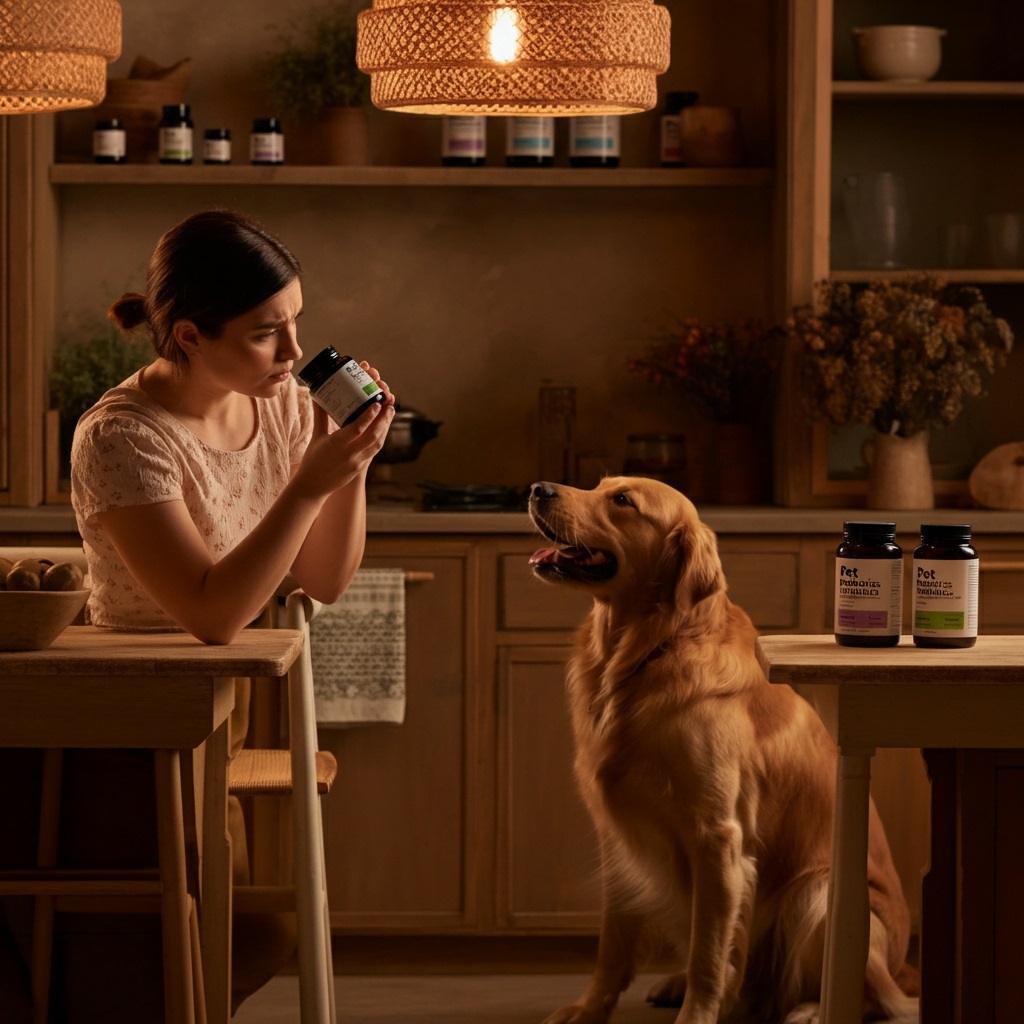
Walk down the pet food aisle at your local store, and you’ll notice something new. Bottles of probiotic supplements sit alongside traditional treats, while dog food bags boast “live cultures” and “digestive support” on their labels. The pet probiotic market has exploded, with sales reaching hundreds of millions of dollars annually.
But are these supplements truly beneficial for your furry friends, or have we fallen for another marketing trend? Pet owners are increasingly willing to invest in their animals’ health, often mirroring human wellness trends. Probiotics represent one of the fastest-growing segments in pet nutrition, yet the science behind their effectiveness remains complex.
This comprehensive guide examines the current research on pet probiotics, explores their potential benefits and limitations, and helps you make an informed decision about whether these supplements deserve a place in your pet’s daily routine. We’ll separate the marketing claims from the scientific evidence and provide practical guidance for pet owners navigating this expanding market.
Understanding Pet Probiotics: The Science Behind the Supplements
Probiotics are live microorganisms that, when administered in adequate amounts, confer health benefits to the host. For pets, these typically include specific strains of bacteria such as Lactobacillus acidophilus, Bifidobacterium animalis, and Enterococcus faecium. These beneficial bacteria aim to support the complex ecosystem living in your pet’s digestive system.
The gut microbiome plays a crucial role in animal health, influencing digestion, immune function, and even behavior. Just like humans, pets can experience disruptions to their intestinal flora due to stress, illness, dietary changes, or antibiotic treatments. Theoretically, probiotic supplements can help restore balance to this delicate ecosystem.
However, the pet microbiome differs significantly from the human version. Dogs and cats have evolved distinct digestive systems with unique bacterial populations. What works for human gut health doesn’t automatically translate to pet wellness, which is why species-specific research becomes essential.
Current studies on pet probiotics show mixed but promising results. Some research demonstrates improvements in digestive health, while other studies find minimal differences between treated and control groups. The variability in results often stems from differences in probiotic strains, dosages, study duration, and the specific health conditions being addressed.
The Potential Benefits: What Research Actually Shows
Several peer-reviewed studies have investigated probiotic supplementation in dogs and cats, revealing both encouraging findings and important limitations. Understanding these results helps pet owners set realistic expectations about what probiotics can and cannot accomplish.
Digestive Health Support
The most well-documented benefit of pet probiotics relates to digestive health. Research published in veterinary journals shows that certain probiotic strains can help manage acute diarrhea in dogs, particularly when the condition stems from dietary indiscretion or mild stress. Studies involving shelter dogs, who often experience digestive upset due to environmental changes, have shown reduced diarrhea duration when probiotics are administered.
For cats, the evidence is more limited but still noteworthy. Some studies suggest that specific probiotic strains can help maintain normal bowel movements and support overall digestive comfort. However, the research sample sizes remain relatively small, and results can vary significantly between individual animals.
Immune System Support
The connection between gut health and immune function has sparked interest in probiotics as immune system supporters. Some studies indicate that regular probiotic supplementation may help pets maintain stronger immune responses, potentially reducing the frequency of minor illnesses.
Research involving senior dogs has shown that certain probiotic strains might help support age-related immune function decline. However, these studies typically involve small sample sizes and require larger, longer-term investigations to confirm the findings.
Antibiotic-Associated Benefits
One of the most practical applications for pet probiotics involves antibiotic treatment support. When pets receive antibiotic therapy, these medications can disrupt beneficial gut bacteria along with harmful pathogens. Some veterinary studies suggest that probiotic supplementation during and after antibiotic treatment may help restore normal gut flora more quickly.
This application shows particular promise because it addresses a specific, well-defined situation where gut bacteria disruption is expected. However, timing and strain selection become critical factors, as some probiotics may interfere with antibiotic effectiveness if given simultaneously.
The Limitations: Where the Science Falls Short
Despite the growing enthusiasm for pet probiotics, several significant limitations challenge their widespread adoption as essential health supplements. Understanding these constraints helps pet owners maintain realistic expectations and avoid unnecessary expenses.
Strain-Specific Effects
Not all probiotic bacteria provide the same benefits. Research consistently shows that probiotic effects are highly strain-specific, meaning that positive results from one bacterial strain don’t automatically apply to others. Many commercial pet probiotic products contain multiple strains or use strains that haven’t been specifically studied in pets.
This creates a significant gap between marketing claims and scientific evidence. A product might contain “beneficial bacteria” without containing the specific strains proven effective in peer-reviewed research. Pet owners often assume that any probiotic supplement will provide similar benefits, but the science doesn’t support this broad generalization.
Survival and Colonization Challenges
For probiotics to work effectively, the bacteria must survive the journey through the digestive system and establish themselves in the gut. This proves more challenging than many pet owners realize. Stomach acid, digestive enzymes, and existing gut bacteria all work to eliminate foreign microorganisms, including potentially beneficial ones.
Studies examining probiotic survival rates in pet digestive systems show significant variability. Some products demonstrate poor bacterial survival, while others maintain viability but fail to establish lasting colonies. This means that even high-quality probiotic supplements may provide only temporary benefits, requiring continuous supplementation to maintain any positive effects.
Individual Variation
Pet responses to probiotic supplementation vary dramatically based on factors such as age, health status, existing gut bacteria, diet, and genetics. What works well for one dog may provide no benefit for another, even within the same breed and household. This individual variation makes it difficult to predict which pets will respond positively to probiotic treatment.
Veterinary research hasn’t yet identified reliable markers to predict which animals will benefit most from probiotic supplementation. This uncertainty means that pet owners often must try supplements for several weeks to determine effectiveness, leading to potential frustration and wasted resources.
Continues after advertising
Quality Concerns: Not All Products Are Created Equal
The pet supplement industry faces fewer regulatory requirements than human supplements, creating significant quality control challenges. This regulatory gap has led to concerning variations in product quality, potency, and labeling accuracy among pet probiotic supplements.
Manufacturing Standards
Independent laboratory testing of commercial pet probiotic products has revealed troubling inconsistencies. Some supplements contain far fewer live bacteria than advertised, while others include bacterial strains not listed on the label. Storage and shipping conditions can further compromise product quality, as many probiotic bacteria require refrigeration to maintain viability.
Unlike prescription medications, pet probiotic supplements don’t require pre-market safety and efficacy testing. This means that products can reach store shelves without scientific evidence supporting their specific formulations or claimed benefits.
Label Claims vs. Reality
Marketing claims on pet probiotic products often exceed the available scientific evidence. Phrases like “supports digestive health” or “boosts immunity” may sound scientifically grounded but often lack specific research backing for the particular product formulation.
Some manufacturers use human probiotic research to support pet product claims, despite significant differences between human and animal digestive systems. This practice can mislead pet owners into believing that products have stronger scientific support than actually exists.
Making an Informed Decision: Guidelines for Pet Owners
Given the mixed research landscape and quality concerns, how should pet owners approach the question of probiotic supplementation? Several practical guidelines can help you make an informed decision that prioritizes your pet’s health and your budget.
Consult Your Veterinarian First
Before starting any probiotic supplement, discuss your pet’s individual health status with a qualified veterinarian. Some animals with compromised immune systems or serious health conditions may not be good candidates for probiotic supplementation. Your veterinarian can also help identify whether your pet’s symptoms might indicate underlying conditions requiring medical treatment rather than supplementation.
Veterinarians familiar with current probiotic research can recommend specific products with better scientific backing or suggest alternative approaches to address your pet’s health concerns. They may also help you establish realistic expectations about potential benefits and timelines.
Focus on Specific Situations
Probiotics show the most promise for specific, well-defined situations rather than general health maintenance. Consider probiotic supplementation when your pet experiences digestive upset due to stress, dietary changes, or antibiotic treatment. These scenarios provide clearer rationales for supplementation and better chances of observable benefits.
Avoid using probiotics as a substitute for proper veterinary care when dealing with chronic digestive issues, persistent diarrhea, or other ongoing health problems. These conditions may require medical diagnosis and treatment rather than supplementation.
Research Product Quality
If you decide to try probiotic supplements, invest time in researching product quality and manufacturer reputation. Look for companies that provide detailed information about their bacterial strains, colony-forming units (CFUs), storage requirements, and quality testing procedures.
Products with third-party testing certificates or those manufactured under veterinary oversight typically offer better quality assurance. Avoid products with vague labeling or those that make broad, unsupported health claims.
Alternative Approaches: Supporting Pet Health Naturally
While probiotics represent one approach to supporting pet digestive health, several other strategies may provide similar or superior benefits without the uncertainties surrounding supplementation.
Dietary Fiber and Prebiotics
Prebiotics are non-digestible compounds that feed beneficial gut bacteria, potentially providing more sustainable support than live bacterial supplements. High-quality pet foods containing appropriate fiber sources can naturally support healthy gut bacteria populations.
Fresh vegetables, certain grains, and specialized prebiotic supplements may offer more reliable benefits than probiotic bacteria, as they don’t face the survival challenges associated with live microorganisms.
Stress Reduction
Since stress significantly impacts gut health in pets, addressing environmental stressors may provide more comprehensive benefits than supplementation alone. Regular exercise, consistent routines, and gradual transitions during life changes can help maintain digestive health naturally.
For pets prone to anxiety-related digestive issues, behavioral interventions or anxiety management strategies might prove more effective than probiotic supplements.
High-Quality Nutrition
The foundation of good digestive health remains consistent, high-quality nutrition appropriate for your pet’s life stage and health status. Premium pet foods formulated with digestible ingredients and appropriate nutrient profiles often provide better digestive support than adding supplements to lower-quality diets.
Working with your veterinarian to select optimal nutrition for your specific pet may yield better results than supplementing an inadequate diet with probiotics.
Read More👉 The Latest Study on Pet Longevity by Breed
The Verdict: Navigating Hype and Promise
Pet probiotics occupy a complex middle ground between promising science and marketing hype. Current research suggests genuine potential benefits for specific situations, particularly digestive upset related to stress or antibiotic treatment. However, the evidence doesn’t support probiotics as essential supplements for all pets or as solutions for serious health problems.
The significant variations in product quality, strain effectiveness, and individual pet responses mean that probiotic supplementation remains somewhat experimental for most animals. Pet owners considering these supplements should approach them as potentially helpful additions rather than necessary health requirements.
Quality matters enormously in this market. Pet owners willing to invest in probiotic supplementation should prioritize products with strong quality control, specific strain identification, and reasonable health claims backed by peer-reviewed research.
For many pets, focusing on high-quality nutrition, stress reduction, and regular veterinary care may provide more reliable health benefits than probiotic supplementation. However, for animals facing specific digestive challenges or those recovering from antibiotic treatment, carefully selected probiotic supplements might offer worthwhile support.
The pet probiotic market will likely continue expanding as research progresses and manufacturing standards improve. Future studies may provide clearer guidelines about which pets benefit most from supplementation and which products deliver the most reliable results. Until then, informed skepticism combined with veterinary guidance represents the most sensible approach for pet owners navigating this evolving field.






